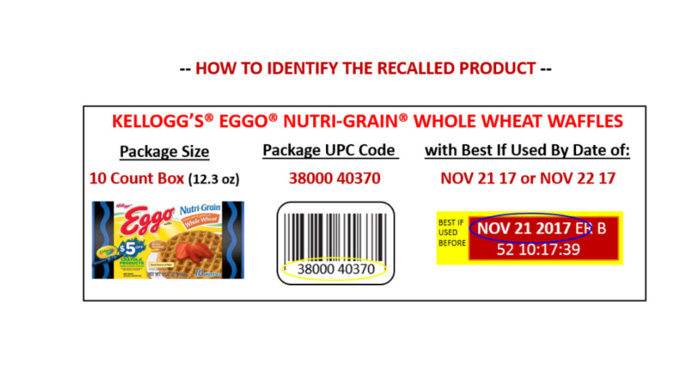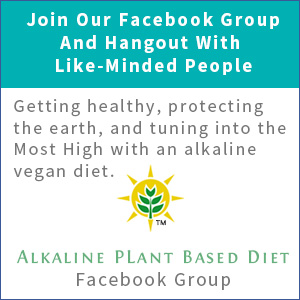Eggo Waffles Recalled Due to Possible Listeria Contamination

Source: Nola
Kellogg Co. has issued a 25-state-wide voluntary recall of about 10,000 cases of Eggo Nutri-Grain Whole Wheat Waffles, because they might be infected with the bacterium Listeria monocytogenes.
According to a press release issued by Kellogg, “The recall is a result of routine tests that the company conducts which identified the potential for contamination. As soon as the company learned of a potential concern, it moved quickly to identify any foods that might be impacted and resolve the issue.”
The recall does not include Louisiana. For a list of the 25 states, read the company’s release.
The UPC code for the recalled waffles is 38000 40370. The recall is for the 12.3 oz (10 count) box of Kellogg’s Eggo Nutri-Grain Whole Wheat Waffles with the “better if used before date” of Nov. 21, 2017, and Nov. 22, 2017.
Kellogg is asking customers to throw away recalled waffles and contact the company for a full refund. Consumers can call 1-800-962-1413, Monday through Friday, 9 a.m. to 6 p.m. Eastern or by visiting https://www.kelloggs.com/en_US/contact-us.html
The bacterium Listeria monocytogenes can cause infection, particularly in “older adults, pregnant women, newborns, and adults with weakened immune systems,” according to the Centers for Disease Control and Prevention, which calls it “an important public health problem in the United States.”
Typical symptoms include fever, muscle aches, diarrhea and other gastrointestinal symptoms, as the infection generally takes hold in the intestines. And it can be deadly. The CDC estimates that listeria hospitalizes around 1,600 people each year, killing around 260.
Some outbreaks, of course, are worse than others. In 2011, an outbreak of listeriosis – the name for the infection the bacterium causes – at a Colorado cantaloupe farm killed 33 people.
While, as the CDC noted, “Listeria monocytogenes is commonly found in soil and water,” most people contract the bacterium (thus, the infection) through tainted foodstuff.
The issue is that listeria not only lives but thrives in the cold.
“It likes places that are cold and wet and where there is something it can grow on,” Robert Tauxe, who helps lead the foodborne diseases division at CDC, told Today. “Unfortunately, food factories with good refrigeration systems are a place listeria is known to hang out. It takes some care and it takes specifically looking for it and disinfecting when it is found. It is a challenge to many food factories.”
The best way to eradicate listeria from foodstuff is through pasteurization.
But there’s a good chance that anyone who regularly consumes news already knows this.
The past few years have seen a number of either listeria outbreaks or fears of them. In fact, as recently as 2009, Kellogg issued a recall of several varieties of its Eggo waffles after the Georgia Department of Agriculture found listeria in Kellogg’s Atlanta-based plant.
In May, CRF Frozen Foods issued a massive, nationwide recall of almost 360 frozen fruits and veggies after a listeria outbreak killed two and hospitalized eight. And once the South’s go-to brand for ice cream, Blue Bell suffered a temporary shutdown of its manufacturing plants and a $850,000 fine after a listeria outbreak.
A quick Google search for listeria, salmonella or E. coli (even hepatitis A) will bring up a list of brand names beloved by American appetites, from Blue Bell to Chipotle.
It leads to the obvious question: do we find more foodborne illness outbreaks than we used to?
The answer is simple and might sound terrifying: yes, by a wide margin.
As Lena H. Sun wrote in The Washington Post, “Major foodborne outbreaks in the United States have more than tripled in the last 20 years, and the germs most frequently implicated are familiar to most Americans: Salmonella, E. coli, and Listeria.”
The question less asked, though is this: Is this a good thing?
Some argue it is. Of course, any illness or death is inherently negative, but some believe that the fact that we know about these outbreaks is a sign of progress.
In his Quartz piece, “The system for catching dangerous pathogens in America’s food supply is finally working,” journalist Chase Purdy makes this very argument.
Purdy points to the Food Safety Modernization Act, signed into law by President Barack Obama in 2011 which, among other things, forces companies to act if a pathogen is detected in their facilities. That wasn’t always the case, Purdy wrote.
“If an ice cream company found listeria in its facility pre-FSMA, it wasn’t required to do anything,” Sandy Eskin, director of the Pew Charitable Trusts’ food safety campaign, told Quartz. “Now, starting in mid-September, they’re going to be responsible . . . for taking steps to prevent problems and the government is going to hold them accountable.”
And it’s true that great oversight and great technology has proven useful. As The Post reported, CDC officials have used gene-sequencing tools to discover the origin of outbreaks more quickly than in the past, and “officials say, they’ve been able to solve some ‘cold cases’ by finding contaminated food responsible for unsolved illnesses.” (In the Blue Bell case, for example, the CDC was able to connect 5-year-old cases of listeriosis to the outbreak.)
As Sun reported:
“By using that technology and detailed questionnaires on what people ate before they got sick, CDC, FDA and the U.S. Department of Agriculture solved nine listeria outbreaks in the last year, compared with two the previous year.”
But CDC Director Thomas Frieden also said the outbreaks tend to involve deadlier pathogens. “On average, there are about two per month, and they can be big and they can be lethal,” he said
(c) 2016, The Washington Post. Travis M. Andrews wrote this story.







